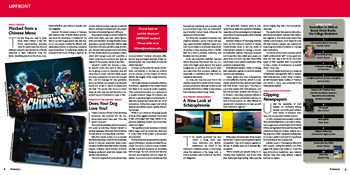A NEW LOOK AT SCHIZOPHRENIA
 The colorful apartment has four rooms: a living room, bedroom, bathroom, and kitchen. Medications are stored in the bathroom’s medicine cabinet. A clock hangs above the television in the living room. A Post-it reminder note is visible on the kitchen refrigerator.
The colorful apartment has four rooms: a living room, bedroom, bathroom, and kitchen. Medications are stored in the bathroom’s medicine cabinet. A clock hangs above the television in the living room. A Post-it reminder note is visible on the kitchen refrigerator.
This apartment, however, exists as a dynamic virtual reality tool created by a Wesleyan researcher and his co-investigators to help learn more about the neurocognitive skills of people with schizophrenia.
Assistant Professor of Psychology Matthew Kurtz led this National Institute of Mental Health-funded study to test the ability of schizophrenic patients to manage a simulated medication regimen. Previously, clinicians and researchers have relied upon paper and pencil tests, but Kurtz says that virtual reality can provide a more realistic assessment of the problems individuals face.
Schizophrenia patients’ ability to manage their medication regimen is critical for positive outcome, yet challenging.
“Many people who have schizophrenia or schizoaffective disorder (which is a very closely related disorder) have limited insight into their illness,” Kurtz says. “The other issue is that people with schizophrenia—and this has just been revealed over the past 15 to 20 years—have fairly profound deficits in attention, memory, and problem solving. For both of those reasons, it’s often difficult for people with schizophrenia to keep up with their medication regimen.”
While paper and pencil tests of neurocognitive function “capture some important aspects of cognition,” they don’t capture cognition in the way “it actually plays out in everyday life,” he explains.
“We’ve actually got people trying to remember their medication, and at the same time, they’ve got dogs barking, they’ve got the phone ringing, they hear a fire truck go by,” Kurtz says.
The results show that patients with schizophrenia are less able to maintain their medication regimen in the virtual environment than healthy control subjects. Kurtz hopes his work will help clinicians develop new methods for improving the ability of patients to manage their medications.
The virtual environment provides mental health professionals with “a very quick window into how easy it will be for the client, based on their cognitive skills, to remember to take a variety of medications at specific times,” Kurtz says.
“A Virtual Reality Apartment as a Measure of Medication Management Skills in Patients With Schizophrenia: A Pilot Study,” conducted with Elizabeth Baker, Godfrey D. Pearlson and Robert S. Astur, was published in the Schizophrenia Bulletin.
